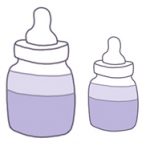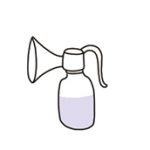You have just got comfortable with breastfeeding and it’s already time to go back to work. Isn’t it hard having such short maternity leave! Don’t worry, you can manage this phase in accordance with your wants and needs, if you want to express a lot, a little or none at all! Don’t forget the golden rule: preparation is key!

Preparation…
First things first. If you are going back to work and wish to continue to feed Baby your breast milk, start by going over all the eventualities. The earlier the better: you’ll need to explain this choice to a few people (including your boss).
With your loved ones
Firstly, let’s talk about the star of the show: Baby. If they willingly drink your milk from a bottle with anyone, you’re off to a good start. The hardest part is over: Baby just needs to get used to being cared for by a new person. If this isn’t the case, don’t propose a bottle with your milk in it too regularly, it is quite unlikely that they will drink it. Worse yet, this may have a psychological impact: why would you force this plastic thing on them rather than your breasts?
Most babies learn to adapt on the big day and understand this change when confronted with it.
Don’t forget that there are many other ways to drink milk than from bottles (which can cause nipple confusion).
Now for your friends and colleagues. Their help is essential: the more support you receive, the easier it will be to breeze through this new milky adventure. If you do receive any negative comments, don’t pay attention to them. This is your choice, you aren’t harming anyone (quite the opposite actually) and their opinion is not welcome here.
With your nanny/child minder/day-care employees…

Many of these people seem to think breastfed babies are harder to look after. Nonsense! Of course, Baby needs some time to adapt to this new situation, but the same applies for formula-fed babies too. Don’t hesitate to draft a short note card about storing breast milk and the many recipients you can use to feed it to Baby: establishing a good dialogue from the outset will limit arguments.
With an breastfeeding support group or lactation consultant
Expressing milk is quite an art that can take time to master; if you do struggle, it is wise to seek advice from a specialist. They will be more than happy to help!
With your employer
Check the legal texts that stipulate to what extent you are protected as a breastfeeding mum. In the meantime, start discussing pumping at the workplace with your boss. If they grumble, try to explain that continuing to breastfeed will reduce the risk of Baby catching a cold, which will limit the number of days you’ll need to take off to look after your child. A point that will probably win them over!
Expressing milk
Don’t be disheartened if you aren’t a huge fan of breast pumps, you may not even need to use one at the workplace the whole time you breastfeed as a working mum. For many mothers, their lactation adapts to their new work schedule. At first, it may be necessary to express twice a day, but this generally decreases. Feeds and pumping will soon take place at home!
It can take a few weeks for your breasts to adapt. Eventually you will be able to go the whole day without pumping and you’ll express more than enough, morning, evening, and on your days off. Giving your breasts time to get used to these changes is the best way to avoid engorgement or a decrease in milk production.
When it comes to choosing a breast pump, go for the one you feel most comfortable with. If the one you are using doesn’t suit you, change. Or, if it isn’t quick enough, find one with double pumping.
Since your boss is fine with you expressing your milk at work, ask if it is possible to use an empty room, with a plug and, preferably, a comfy chair. Don’t forget, communication is key: discuss this choice as far ahead of time as possible, do not force them into this. And, if you are allowed to store your freshly expressed milk in the staffroom fridge, why not buy some sweet treats as a thank you. For transport and storage, an insulated bag and ice blocks are must-haves.
Little tips
Now that your childcare provider is aware of your choice, as well as your boss, friends and family, you can go back to work with peace of mind. Here are a few more tips to ensure you successfully embrace this change:
Stock up
Try to store enough milk for several days, there are many reasons for your production to decrease: a stressful meeting, that time of the month, feeling ill or drowsy…
Vary amounts
Do not always store the same amount of milk, freeze a variety of volumes. You won’t know exactly what Baby needs in advance, whether it’s an entire feed or just a supplement.
Warm up
Place a heated breast pad in your bra a few minutes before pumping, this will help you express an optimal amount of milk.
Be organised
Just like when you were in school, prepare your bag the night before. To avoid forgetting something and/or not getting annoyed because you’re late.
Be prepared
Make sure you have a small manual pump at work just in case you cannot use your electric one: unscheduled business meeting, power cut, etc.
Laugh!
A colleague made a nasty comment? Don’t let this shake you, and learn to respond lightly.
What about your breasts?
Milk management

If Baby drinks bottles at day care, they should not feed from a bottle at home. Nursing morning and evening is not sufficient to keep up your milk production. So, as soon as you are with Baby, it’s open (milk) bar! If your breasts are stimulated sufficiently during this time, your production will be optimal.
Baby doesn’t always have to feed at the same time. Trust Baby, they will quickly understand that there are now two ways of getting your milk: scheduled bottles at day care and responsive feeding at home.
These excerpts are from My completely illustrated Breastfeeding Book.







